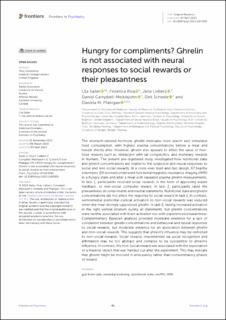| dc.contributor.author | Sailer, Uta | |
| dc.contributor.author | Riva, Federica | |
| dc.contributor.author | Lieberz, Jana | |
| dc.contributor.author | Campbell-Meiklejohn, Daniel | |
| dc.contributor.author | Scheele, Dirk | |
| dc.contributor.author | Pfabigan, Daniela Melitta | |
| dc.date.accessioned | 2023-09-05T12:30:17Z | |
| dc.date.available | 2023-09-05T12:30:17Z | |
| dc.date.created | 2023-04-13T21:53:06Z | |
| dc.date.issued | 2023 | |
| dc.identifier.issn | 1664-0640 | |
| dc.identifier.uri | https://hdl.handle.net/11250/3087509 | |
| dc.description.abstract | The stomach-derived hormone ghrelin motivates food search and stimulates food consumption, with highest plasma concentrations before a meal and lowest shortly after. However, ghrelin also appears to affect the value of non-food rewards such as interaction with rat conspecifics, and monetary rewards in humans. The present pre-registered study investigated how nutritional state and ghrelin concentrations are related to the subjective and neural responses to social and non-social rewards. In a cross-over feed-and-fast design, 67 healthy volunteers (20 women) underwent functional magnetic resonance imaging (fMRI) in a hungry state and after a meal with repeated plasma ghrelin measurements. In task 1, participants received social rewards in the form of approving expert feedback, or non-social computer reward. In task 2, participants rated the pleasantness of compliments and neutral statements. Nutritional state and ghrelin concentrations did not affect the response to social reward in task 1. In contrast, ventromedial prefrontal cortical activation to non-social rewards was reduced when the meal strongly suppressed ghrelin. In task 2, fasting increased activation in the right ventral striatum during all statements, but ghrelin concentrations were neither associated with brain activation nor with experienced pleasantness. Complementary Bayesian analyses provided moderate evidence for a lack of correlation between ghrelin concentrations and behavioral and neural responses to social rewards, but moderate evidence for an association between ghrelin and non-social rewards. This suggests that ghrelin’s influence may be restricted to non-social rewards. Social rewards implemented via social recognition and affirmation may be too abstract and complex to be susceptible to ghrelin’s influence. In contrast, the non-social reward was associated with the expectation of a material object that was handed out after the experiment. This may indicate that ghrelin might be involved in anticipatory rather than consummatory phases of reward. | en_US |
| dc.language.iso | eng | en_US |
| dc.publisher | Frontiers | en_US |
| dc.rights | Navngivelse 4.0 Internasjonal | * |
| dc.rights.uri | http://creativecommons.org/licenses/by/4.0/deed.no | * |
| dc.subject | Tarmhormoner | en_US |
| dc.subject | Gut hormones | en_US |
| dc.subject | FMRI | en_US |
| dc.subject | FMRI | en_US |
| dc.subject | Sosial kognisjon | en_US |
| dc.subject | Social cognition | en_US |
| dc.title | Hungry for compliments? Ghrelin is not associated with neural responses to social rewards or their pleasantness | en_US |
| dc.type | Journal article | en_US |
| dc.type | Peer reviewed | en_US |
| dc.description.version | publishedVersion | en_US |
| dc.rights.holder | Copyright 2023 The Author(s) | en_US |
| dc.source.articlenumber | 1104305 | en_US |
| cristin.ispublished | true | |
| cristin.fulltext | original | |
| cristin.qualitycode | 1 | |
| dc.identifier.doi | 10.3389/fpsyt.2023.1104305 | |
| dc.identifier.cristin | 2140736 | |
| dc.source.journal | Frontiers in Psychiatry | en_US |
| dc.relation.project | Helse Sør-Øst RHF: 2021046 | en_US |
| dc.relation.project | Norges forskningsråd: 275316 | en_US |
| dc.relation.project | Norges forskningsråd: 323047 | en_US |
| dc.subject.nsi | VDP::Psykologi: 260 | en_US |
| dc.subject.nsi | VDP::Psychology: 260 | en_US |
| dc.subject.nsi | VDP::Psykologi: 260 | en_US |
| dc.subject.nsi | VDP::Psychology: 260 | en_US |
| dc.identifier.citation | Frontiers in Psychiatry. 2023, 14, 1104305. | en_US |
| dc.source.volume | 14 | en_US |

